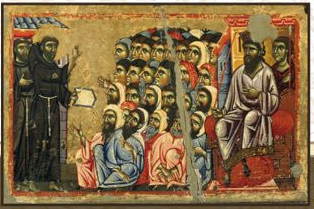
A radical example
This time last week no-one knew who the new pope would be. Suddenly on Tuesday evening, while the whole world was watching, the choice of the new pontiff’s name turned the global spotlight on a bare-footed young Italian who dared to live in radical obedience to the teachings of Jesus.
What is it about Francis of Assisi that resonates with believer and non-believer alike? Even the world’s press has been surprisingly positive about the Argentinian cardinal’s unprecedented selection of the name he’ll be known by for the rest of his life.
For, eight hundred years after this son of a wealthy merchant disowned his family’s wealth to demonstrate what it meant to follow Jesus, St Francis remains probably the world’s most popular saint outside of biblical characters.
His identification with the poor, his love for the environment and nature, plus his commitment to peace and love continue to endear the saint to millions, and inspire many to live out the teachings of the Sermon on the Mount.
Pope Francis told journalists last week that when he realised he would need to choose a new name, he immediately thought of Francis because of the saint’s commitment to the poor, to peace and to the natural environment.
This is good news in a time of economic crisis that has been fed by a mentality that ‘greed is good’ and by insatiable desire for ‘more’. Simply with the choice of a name, a message has gone out worldwide that there is an alternative way to live.
Bridges
In Francis’ day, the establishment was shocked by his radical adherence to the commands of Jesus, for example, to love one’s enemies. Those were the days of the Crusades, called for by popes and emperors, yet challenged by Francis who himself travelled to Egypt where he shared the gospel with Sultan al-Malik al-Kamel. Although remaining unconverted, the sultan was deeply impressed. Today visitors to Assisi can view the ivory carved horn given to Francis by the sultan as a token of friendship.
While the Crusaders built castles, Francis built bridges. That has not gone unnoticed among Muslims who also regard the saint as a holy man.
The Italian Islamic Religious Community responded last week to the new pope’s name saying: ‘As Muslims of the West, we take as a particularly hopeful sign the reminder of the great example of sanctity and opening to the East and to Islam that St Francis of Assisi gave’.
Francis’ love for animals and for what we now call the environment prompted John Paul II to declare him patron saint of ecologists. Bergoglio’s choice of name has raised hopes that environmental issues will now be given higher priority.
Slums
As I travel around Europe, often leading tours through Europe’s ancient cities, I am constantly encountering streets and places bearing names referring to Francis’ followers. Even before Francis’ death in 1226, communities of the Franciscan orders, the Lesser Brothers, the Poor Clares and the Tertiaries, had spread through northern Italy across to France, Belgium and Spain.
As they sought to spread the ideals of their founder throughout the newly emerging urban social order of the Middle Ages, they often settled in the urban slums where the huts and shacks of the poorest were built outside the safety of the city walls.
In Amsterdam, Utrecht and other Dutch cities, churches, buildings and street names still testify to the major role this movement played in city life. In Stockholm last year I visited the Sankta Klara Church, established by Franciscan sisters, or Poor Clares as early as the 13th century.
In London, these urban missionaries settled in what was called ‘Stinking Lane’. A bishop of Lincoln noted that the people ‘run to the friars for instruction as well as for confession and direction. They are transforming the world.’
Radical discipleship for them meant the incarnation of good news into a world of poverty and plague.
With the crises in Europe today threatening to lead to further unrest and unemployment, the pope’s unexpected name choice has been a timely and encouraging reminder of how radical disciples of Jesus can still effect reformation and transformation.
Till next week,
Jeff Fountain

This Post Has 0 Comments